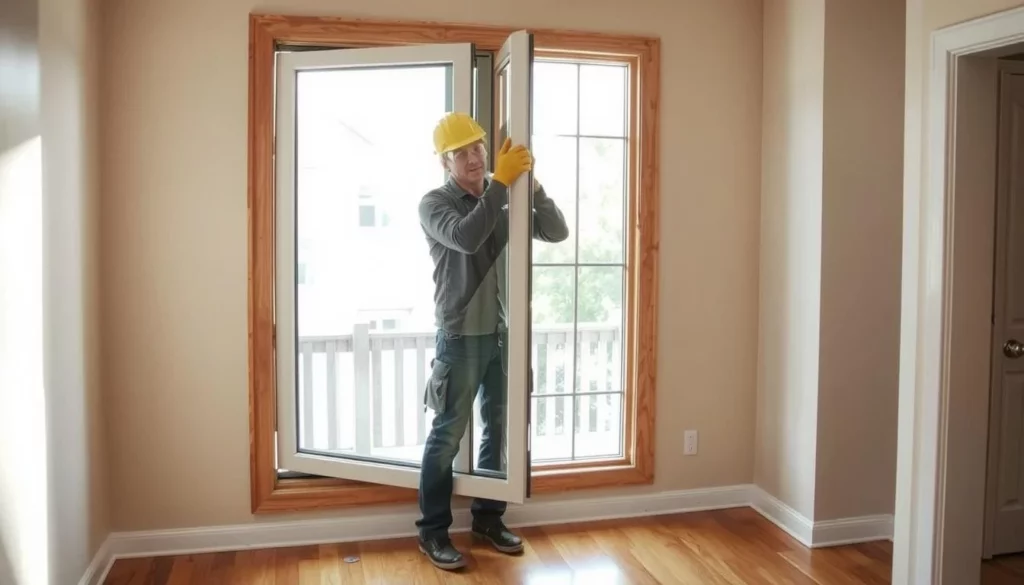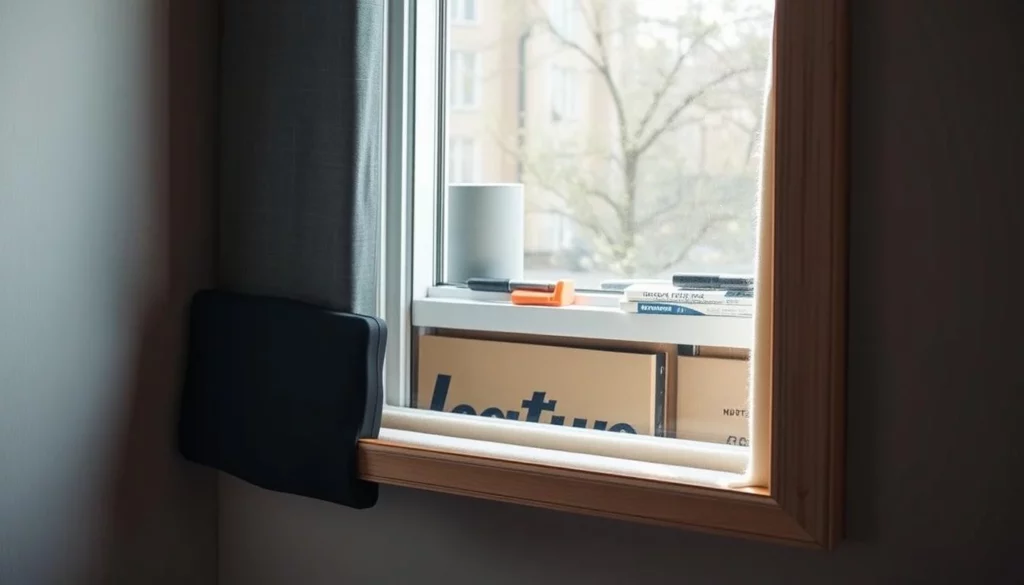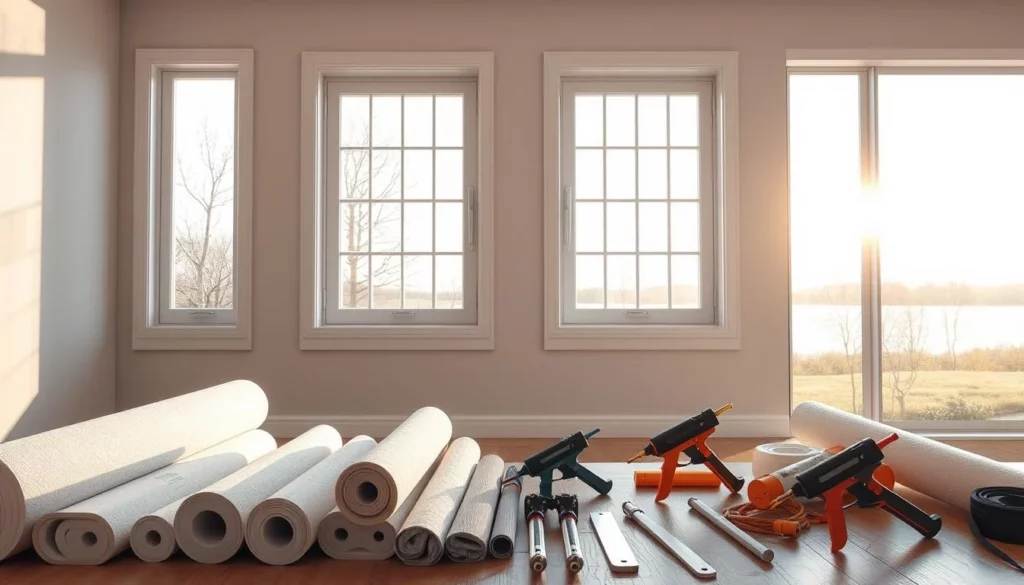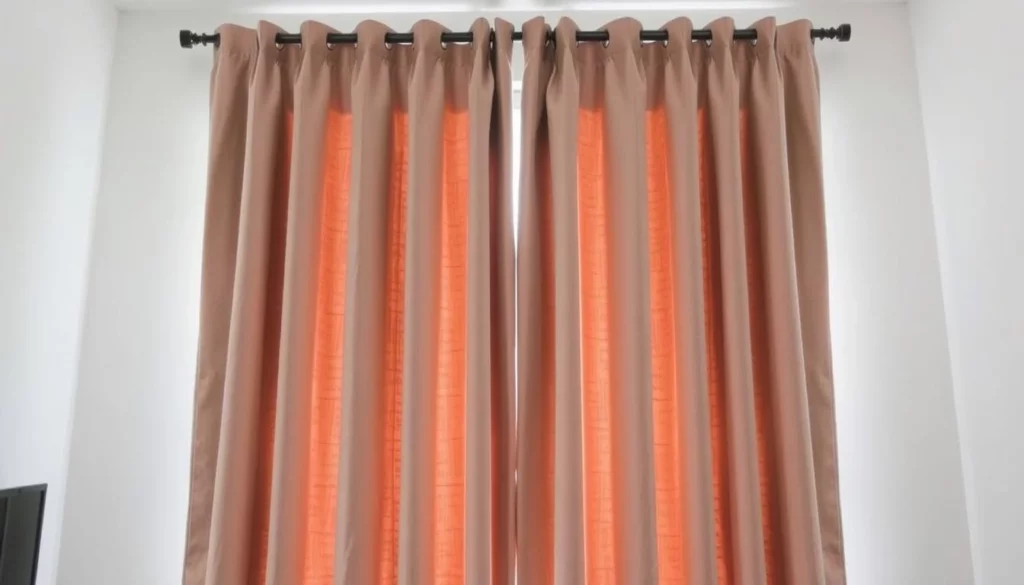Are you tired of the constant noise pollution in your home? Soundproofing your windows can make a big difference. It helps reduce distracting noise, making your home more peaceful.
Soundproofing uses materials and techniques to block noise through your windows. You can use soundproofing materials like acoustic caulk and mass-loaded vinyl. Or, you can install noise reduction windows. This approach offers many benefits, including better privacy and higher property value.
By upgrading to soundproof windows, you can make your home more comfortable and quiet. This simple change can greatly improve your daily life.
Understanding Soundproof Windows
Soundproof windows do more than just reduce noise. They bring many benefits to homeowners. It’s key to know what they are and how they work before upgrading.
What Are Soundproof Windows?
Soundproof windows help make your home quieter. They have multiple layers of glass and air gaps. These features absorb or block sound.
Key components of soundproof windows include:
- Multiple panes of glass
- Air gaps or specialized gases between panes
- Specialized frames that ensure a tight seal
How Do They Work?
Soundproof windows stop sound waves from passing through. When sound hits, it vibrates the glass. These vibrations then carry the sound to the other side.
These windows reduce vibrations with multiple layers and materials. They absorb sound energy.
The design of soundproof windows is key to their effectiveness. Let’s compare standard windows to soundproof ones:
| Feature | Standard Windows | Soundproof Windows |
|---|---|---|
| Glass Layers | Single layer | Multiple layers |
| Frame Material | Varied, often less robust | Specialized for tight seal |
| Noise Reduction | Limited | Significant |
Knowing how soundproof windows are made and work helps you decide if they’re right for your home.
Benefits of Soundproof Windows
Soundproof windows can greatly improve your life. They cut down on noise, making your home or office quieter. This is great for those who live in loud areas or have trouble focusing because of noise.
Improved Privacy and Comfort
Soundproof windows bring more privacy and comfort. They block out most external noise, creating a calm space. This is very helpful for places near highways, airports, or other loud spots. Soundproof windows can significantly reduce noise pollution, helping you relax, work, or sleep better.
Energy Efficiency Gains
Soundproof windows also save energy. They often have double or triple glazing to keep heat in. This means you use less energy and pay less for utilities. By choosing energy-efficient soundproof windows, you save money and stay comfortable.
| Benefits | Soundproof Windows | Standard Windows |
|---|---|---|
| Noise Reduction | High | Low |
| Energy Efficiency | High | Low-Moderate |
| Property Value | Increased | No Impact |
Increased Property Value
Soundproof windows can also boost your property’s value. People looking to buy often want homes or offices that are quiet and comfortable. By installing soundproof windows, you make your property more appealing. This could lead to a higher sale price. This can be a significant advantage if you plan to sell your property.
Key Features to Consider
When looking into soundproofing options, it’s important to know what makes soundproof windows work. Several key factors help ensure you get the sound reduction you need.
Window Frame Materials
The material of the window frame is crucial for soundproofing. Different materials have different soundproofing abilities. For example:
- Vinyl frames are durable and help seal well, improving soundproofing.
- Wooden frames are classic and can work well if sealed properly.
- Aluminum frames are less common but can be used in some cases.
Choosing the right frame material depends on your needs, budget, and home style.
Glass Thickness and Composition
The glass’s thickness and type are key for soundproofing. Thicker glass blocks more sound. Some windows use:
- Laminated glass, with plastic in between the glass panes, for better soundproofing.
- Double or triple glazing, with gaps between glass panes, to block sound well.
Specialized glass types can also boost soundproofing, offering better noise reduction.
Sealing and Installation Quality
Even with great frames and glass, bad sealing and installation can ruin soundproofing. A tight seal and professional installation are essential. Important points include:
- Check the seals for gaps or weaknesses.
- Make sure the installation is done by experts.
By paying attention to these details, you can get the most out of your soundproof windows.
Types of Soundproof Windows
Soundproof windows come in different types, each designed for various noise reduction needs. When you’re upgrading to soundproof windows, knowing these types helps you choose wisely.
Double Glazed Windows
Double glazed windows have two panes of glass with a gap in between, often filled with air or gas. This setup blocks noise by adding an extra barrier between your home and the outside. The gap is key because it disrupts sound waves, making it harder for noise to pass through.
Triple Glazed Windows
Triple glazed windows add a third pane of glass with two gaps. This design offers better sound insulation and energy efficiency. With an extra pane and gap, triple glazed windows are perfect for very noisy areas.
Acoustic Laminated Glass
Acoustic laminated glass is made for soundproofing. It has multiple layers of glass and a special interlayer to absorb sound. This glass is great at blocking high-frequency noises and works well with double or triple glazing for better soundproofing.
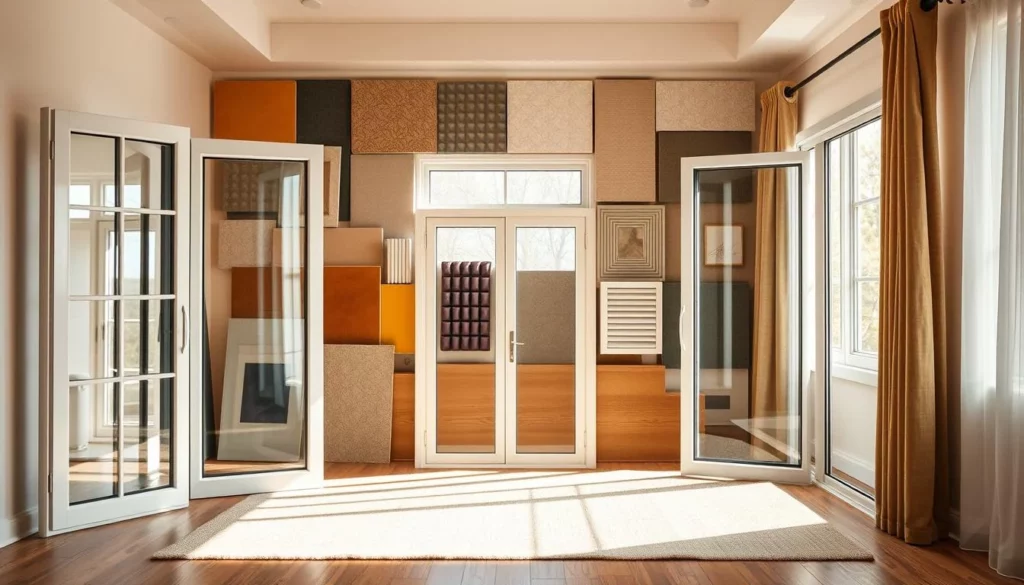
| Window Type | Sound Reduction Capability | Energy Efficiency |
|---|---|---|
| Double Glazed | Good | High |
| Triple Glazed | Excellent | Very High |
| Acoustic Laminated Glass | Excellent (specialty in high-frequency noise) | High |
Choosing the right soundproof window depends on your specific needs. Consider the noise level, your budget, and your preferences. Knowing the different types helps you make a choice that fits your home and lifestyle.
Assessing Your Home’s Noise Problems
To reduce noise, you must know where it comes from and how loud it is. This knowledge helps you pick the right soundproof windows for your home.
Identifying Noise Sources
Start by finding out what makes noise in your home. External noises like traffic, neighbors, and construction are common. Inside, appliances, footsteps, and voices can also be loud.
- Traffic noise
- Neighbor noise
- Construction or industrial noise
- Internal household noise
Measuring Noise Levels
It’s important to measure the noise in your home. Use a sound level meter to check the decibels (dB). This tool shows how loud it is.
| Noise Source | Typical Noise Level (dB) |
|---|---|
| Whisper | 20 dB |
| Normal Conversation | 60 dB |
| Loud Music | 80 dB |
| Traffic Noise | 80-90 dB |
Determining Your Needs
After finding out where the noise comes from and how loud it is, decide what you need. Think about how much sound you want to block and your budget.
Key considerations include:
- The type of noise you’re dealing with (constant, intermittent, high-frequency)
- The desired level of sound reduction
- Your budget for soundproof windows and installation
By following these steps, you can choose the right soundproof windows. They will help solve your home’s noise issues.
Choosing the Right Contractor
Finding the right contractor for soundproof window installation is key. The contractor’s skill greatly affects the job’s quality and speed.
Researching Qualified Professionals
Begin by looking for soundproof window companies in your area. Find ones known for soundproofing and have a solid reputation. Look up online reviews, ask friends, and check their credentials.
Make sure they have the right licenses and insurance. This protects you and the workers.
Also, check with groups like the National Fenestration Rating Council. They certify contractors for soundproof window work.
Questions to Ask Before Hiring
Before you choose, make a list of questions. Ask about their experience, materials, and methods. Also, find out about their warranty and guarantees.
- What is your experience with soundproof window installations?
- Can you provide references or examples of previous work?
- What materials and techniques do you use?
- Do you offer a warranty or guarantee on your work?
Getting Quotes and Estimates
After narrowing your choices, ask for quotes. Compare prices, services, and what’s included. Be cautious of very low prices, as they might mean poor quality.
Make sure the quote covers everything. This includes removing old windows and installing new ones. A clear quote helps you decide better.
Preparing Your Home for Installation
Getting your home ready for soundproof window installation is key. It makes the process smoother and less disruptive. You’ll need to do a few important tasks to help the team work efficiently.
Measuring Existing Windows
Measuring your windows accurately is vital. You need to measure their width, height, and any features like handles. It’s smart to write down these measurements and share them with your team.
Key Measurement Tips:
- Measure at multiple points to account for any variations.
- Record measurements in inches or centimeters.
- Consider hiring a professional if you’re unsure.
Clearing the Installation Area
Clearing the area around your windows is crucial. Move out any furniture, curtains, or items that could get in the way. This makes the installation faster and safer for your belongings.
Tips for Clearing the Area:
- Move furniture away from the windows.
- Remove curtains, blinds, or other window treatments.
- Cover the floor and surrounding areas with protective sheets.
Planning for Noise and Disruption
The installation might be noisy and disrupt your day. Tell your neighbors and plan for any inconvenience. Try to schedule it when it won’t bother you or your family too much.
- Notify your neighbors in advance.
- Consider scheduling the installation during less busy times.
- Make arrangements for alternative accommodations if needed.
By preparing well, you’ll get a great soundproof window installation. It will make your home more comfortable and energy-efficient.
Installation Process Overview
Installing soundproof windows is a detailed process. It needs careful planning and execution. Knowing the steps helps ensure your new windows work well.
What to Expect During Installation
The installation starts with removing your old windows. Then, the team cleans the openings for a perfect fit. They will place the new soundproof windows, making sure they seal and align well. This careful process is crucial for soundproofing and energy efficiency.
Duration of the Installation
The time it takes to install soundproof windows varies. It depends on how many windows and the job’s complexity. Usually, it takes a few hours to a full day. Plan ahead to schedule the installation when it won’t disrupt your day.
Final Inspection and Adjustments
After installation, a final check is done. The team ensures the soundproof windows work right. They check seals, window operation, and soundproofing standards. Any needed adjustments are made to ensure your satisfaction.
Knowing what to expect during installation helps prepare you. It makes your home more comfortable and quieter.
Maintenance Tips for Soundproof Windows
To keep your soundproof windows in great shape, follow a few easy steps. These tips will help your windows last longer and keep them soundproofing well.
Cleaning Best Practices
Cleaning your soundproof windows regularly is key. Use a gentle soap and a soft cloth to clean the frames and glass. Stay away from harsh chemicals or rough materials that could harm the window or break its seal.
Tips for Effective Cleaning:
- Use a mix of water and mild soap for cleaning.
- Don’t spray cleaner directly on the windows. Apply it to a cloth first.
- For tough stains, try a specialized glass cleaner.
Regular Check-ups and Repairs
Regular checks can spot problems early. Look for wear or damage on the seals and frames. If you find gaps or cracks, fix them quickly to keep sound out.
What to Look for During Check-ups:
- Wear on the seals or frames.
- Gaps or cracks that could let sound in.
- Water or condensation between the glass panes.
Signs of Wear and When to Replace
Even with care, soundproof windows will wear out. If they’re not blocking sound as well, it might be time for new ones. Look for damage to the glass or frames and higher energy bills too.
Indicators It’s Time to Replace:
- Consistent drafts or cold spots near the windows.
- Visible cracks or chips in the glass.
- More outside noise coming in.
By keeping up with maintenance and knowing when to replace, your soundproof windows will work their best. If you’re thinking of getting new ones, look into soundproof window companies for advice and quality options.
Cost Considerations
Thinking about getting soundproof windows? It’s important to know the costs involved. The price isn’t just for the windows. It also includes installation, materials, and energy savings.
Average Costs of Soundproof Windows
The average cost of soundproof windows changes based on several things. This includes the type of window, materials, and how hard it is to install. For example, double-glazed windows are cheaper than triple-glazed but might not block sound as well.
On average, you might pay $500 to $1,500 for each window, including installation. For your whole house, expect to spend between $3,000 to $15,000 or more. This depends on how many windows you need and what kind you choose.
Budgeting for Installation
When planning to install soundproof windows, remember it’s not just the windows. Labor costs can differ based on where you live and the installer’s skill. Also, permits and inspections can add to the cost.
It’s smart to get quotes from different installers. This way, you can compare prices and services. For more details on installation and costs, check our soundproof windows cost page.
Potential Savings and Rebate Programs
Even though soundproof windows cost a lot upfront, they can save you money in the long run. Energy-efficient windows can lower your heating and cooling bills. Plus, many companies and governments offer rebates for these windows.
These rebates can help cover the initial cost. So, soundproof windows might be a better deal than you think. To save even more, look for local and national rebates for energy-saving home upgrades.
Making the Final Decision
Thinking about getting soundproof windows? It’s key to look at the good and the bad. Installing soundproof windows can make your life better by cutting down on noise and saving energy. They can also make your home more valuable, which is great if you plan to sell.
Assessing the Benefits
Soundproof windows offer many perks. They make your home quieter, which is good for relaxing and focusing. They also help save energy by keeping your home at a better temperature all year.
Long-term Considerations
Think about the long haul when deciding on soundproof windows. The upfront cost might seem high, but you could save money on bills and increase your home’s value. Choosing the right windows and a good contractor means a quieter, more comfy home for years.
Moving Forward
Ready to upgrade? Pick a trusted contractor and get your home ready for the change. This way, your soundproof window installation will go smoothly.
